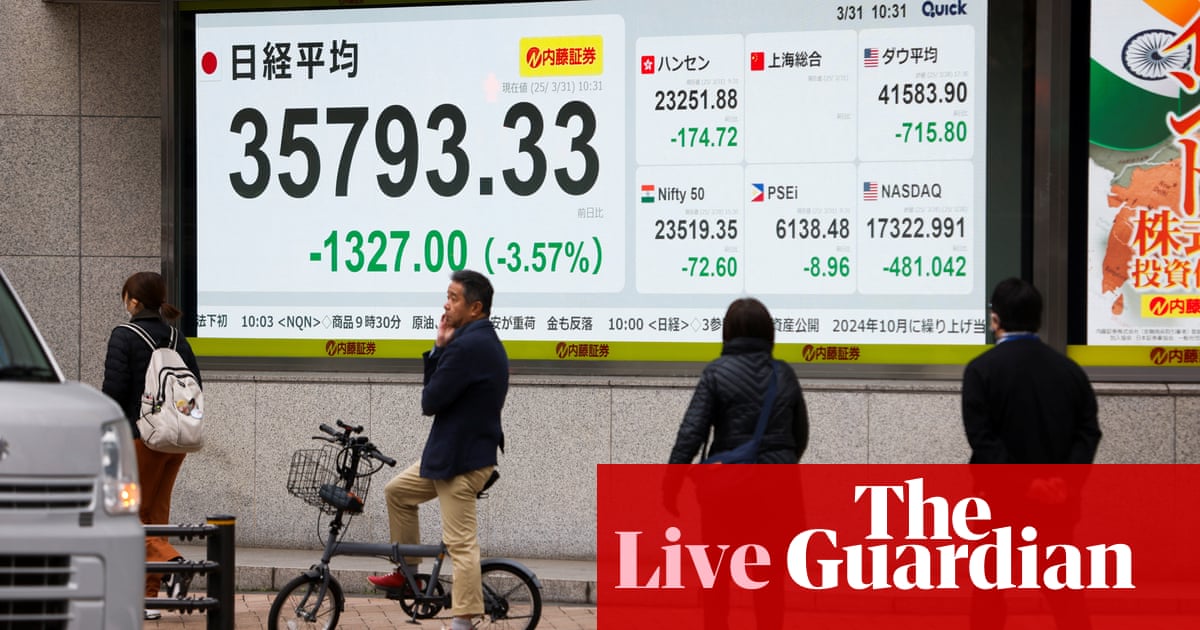
Try our newest merchandise
Introduction: World markets on monitor for greatest month-to-month loss since 2022
Good morning, and welcome to our rolling protection of enterprise, the monetary markets and the world economic system.
Donald Trump’s commerce struggle is alarming the worldwide markets, sending shares sliding of their worst month in over two years.
Inventory markets throughout the Asia-Pacific area are in retreat this morning, as buyers worry Trump will announce swingeing new tariffs on Wednesday, which has been dubbed “Liberation Day” by the US president.
Japan’s Nikkei has misplaced 3.9%, down 1,457 factors at 35,662 factors immediately, whereas South Korea’s KOSPI is down 3%, Australia’s S&P/ASX 200 has fallen 1.7%. In China, which has already been hit by Trump tariffs this yr. the CSI 300 is 0.9% decrease.
These are simply the most recent losses in a foul month for the monetary markets. MSCI’s index of world shares had fallen round 4.5% because the begin of March, even earlier than immediately is priced in, which might be the worst month since September 2022.
At present’s selloff comes after Donald Trump instructed reporters that the reciprocal tariffs he’s set to announce this week will embrace all nations.
He instructed reporters on Air Drive One:
“You’d begin with all nations. Primarily all the nations that we’re speaking about.”
That may be a blow to hopes that the White Home may solely goal nations with the most important commerce imbalances in opposition to the US.
Buyers have additionally been spooked by current dangerous financial information from the US.
On Friday, core inflation rose by greater than anticipated, whereas shopper sentiment weakened to its lowest stage since 2022. That drove shares down on Wall Avenue on Friday, and captured the fears within the markets proper now.
Kyle Rodda, senior monetary market analyst at capital.com, explains:
The dynamic is a microcosm of the important worry available in the market proper now. Commerce coverage and even merely the uncertainty generated by it’s weakening development but in addition contributing to sticky inflation, that means the Fed goes to have marginally much less capability to chop rates of interest if (or when) US financial exercise begins to falter.
The issue was hammered residence additional by a revised College of Michigan Shopper Sentiment survey which revealed even greater 1-year inflation expectations of 5% and a higher deterioration in confidence.
The agenda
-
9.30am BST: Financial institution of England mortgage approvals and shopper credit score
-
1pm BST: German inflation charge for March
-
3.30pm BST: Dallas Fed Manufacturing Index for March
Key occasions
The tumbling markets this morning counsel tariffs are threatening to change into “the flags the worldwide economic system dies underneath,” mentioned Invoice Blain, market strategist at Wind Shift Capital, including:
International commerce wars look all however inevitable. Gold at a report excessive. Shares are promoting off on the expansion implications of Trump’s tariff regime.
Goldman Sachs additionally warning in opposition to making an attempt to name the underside of the present market sell-off, saying:
We proceed to advocate buyers look ahead to an enchancment within the development outlook, extra asymmetry in market pricing, or depressed positioning earlier than making an attempt to commerce a market backside.
Though our Sentiment Indicator has declined sharply throughout the previous couple of weeks (to -1.2), it stays above ranges reached on the troughs of different main sell-offs throughout current years (-2.0 or decrease).
Goldman Sachs lifts possibilities of US recession to 35%
In a worrying signal, Goldman Sachs believes there’s extra hazard that the US economic system falls into recession this yr.
Goldman’s economists now estimate a 35% chance that the US economic system enters a recession throughout the subsequent 12 months, up from 20% beforehand.
They warned that earnings development is more likely to be weaker this yr, and subsequent, than anticipated, telling shoppers:
Larger tariffs, weaker financial development, and higher inflation than we beforehand assumed lead us to chop our S&P 500 EPS development forecasts to +3% in 2025 (from +7%) and +6% in 2026 (from +7%).
UBS cuts S&P 500 goal on account of tariff influence
Swiss financial institution UBS has minimize its forecast for the US inventory market’s good points this yr.
Having beforehand forecast the S&P 500 shares index would finish the yr at 6,600 factors (which might have been a 12% achieve in 2025), UBS have now minimize their end-year goal to six,400 factors.
That will nonetheless characterize fairly a restoration after a poor begin to the yr, which has pulled the S&P 500 down to five,581 factors on Friday evening.
Mark Haefele, chief funding officer at UBS International Wealth Administration, explains:
“After contemplating the consequences of tariffs and slower development information to date in 2025, we now anticipate 6% earnings per share development, and we’ve got accordingly diminished our year-end goal for the index to six,400 (from 6,600).
However this additionally means that there’s nonetheless significant upside for broad US equities by year-end, in our view.”
UBS weren’t alone in forecasting good points on Wall Avenue this yr most brokerages predicted US shares would have risen by December.
With one buying and selling day left of the quarter, danger sentiment has drained from Asian and European inventory markets, says Kathleen Brooks, analysis director at XTB.
She explains:
The Nikkei closed down 4%, whereas European indices are a sea of purple. The unload is broad based mostly, with greater than 550 of the Eurostoxx 600 shares decrease as buyers take fright forward of President Trump’s tarrif announcement that’s due on Wednesday.
The flight to protected havens has despatched the gold value greater by $36 per ounce, and gold is now above $3,122 per ounce. ‘Liberation Day’ for America is dangerous information for international shares, and US futures are additionally pointing to a pointy decline for the S&P 500 later immediately.
‘A bleak environment on buying and selling flooring worldwide’
Europe’s principal inventory indices are a sea of purple, as buyers react to Donald Trump’s declaration that the reciprocal tariffs he’s set to announce this week will embrace all nations.
Italy’s FTSE MIB index has dropped 1.4%, France’s CAC is down 1%, and Germany’s DAX has misplaced 0.95%.
Jochen Stanzl, chief market analyst at CMC Markets, says “a promoting wave is sweeping throughout international markets”, including:
The tariffs imposed by the U.S. authorities and the worry of recent bulletins as early as Wednesday are making a bleak environment on buying and selling flooring worldwide. Simply final Wednesday, the DAX was above 23,000 factors, nevertheless it now seems that the index might quickly take a look at the 22,000 mark.
The chance urge for food seen within the preliminary weeks of the yr has dissipated as buyers and asset managers pull again, scale back positions, and chorus from taking over giant new ones. The inclination to purchase the dips has practically vanished.
Stoxx 600 hits seven-week low
European inventory markets are on the slide, dragging the pan-European Stoxx 600 index right down to a seven-week low.
FTSE 100 falls on the open
The London inventory market is open, and shares are sliding.
The FTSE 100 index of blue-chip shares has dropped to a two-week low in early buying and selling, down 72 factors or 0.85% at 8585 factors.
British Airways guardian firm, IAG, are among the many high fallers, down practically 3%, together with Related British Meals (-4%) after it introduced that the boss of its Primark division had stop after an “error of judgment”.
Mining shares are additionally weaker.
Susannah Streeter, head of cash and markets at Hargreaves Lansdown, says:
“The final day of March is spring-loaded with uncertainty on monetary markets. Unease in regards to the impact of Trump’s tariffs has been amplified, inflicting sharp strikes in the beginning of the week. London-listed shares is not going to be proof against the tariff fall out, with the FTSE 100 set for a tough begin to the week as buyers brace for the debilitating impact of widespread tariffs.
There have been steep falls on indices in Asia as hopes for a extra focused set of recent duties have evaporated. The President’s feedback over the weekend appeared to point that blanket new tariffs could be unleashed on Wednesday, a day he’s dubbed ‘Liberation’ day however one which is more likely to ensnare many extra nations in his punishing commerce insurance policies.
Whereas the implications of his feedback are nonetheless removed from clear, he seems decided to focus on nations that are aggressive in an entire vary of sectors, to strive spark a revival of home-grown industries. However constructing new manufacturing bases will take years, and far greater prices within the meantime, look set to boost costs and depress financial exercise.
Primark boss admits ‘error of judgment’ and resigns after lady’s allegation
The boss of Primark has admitted an “error of judgment” and resigned following an allegation made by a lady about his behaviour in the direction of her in a social setting.
Metropolis buyers are rising extra assured that the Financial institution of England might minimize rates of interest as quickly as its subsequent assembly.
A UK rate of interest minimize in Could is now seen as a 66% chance, in line with the cash markets, up from roughly evens final week.
Buyers are additionally extra assured that the BoE will minimize charges two extra occasions this yr. The cash markets are actually pricing in 53 foundation factors of cuts, that means two quarter-point cuts are totally priced in, which they weren’t final week.
Gold hits one other report excessive
The gold value has hit a brand new all-time excessive immediately, as Donald Trump’s risk of imposing reciprocal tariffs on all nations sparks a rush into save-haven property.
Gold is up 1% immediately at $3,116 per ounce, having earlier traded as excessive as $3,128/oz, including to its robust good points already this yr.
KCM Commerce chief market analyst Tim Waterer says:
“Markets’ nervousness ranges have been ramping up forward of the reciprocal U.S. tariff bulletins, which is protecting gold in excessive demand as a defensive play.
“If the tariff bulletins this week should not as extreme as feared, then the gold value might begin to backtrack as profit-taking from the highs could also be triggered.”
Gold has gained round 9% throughout March, which Reuters has calculated could be its greatest month in a yr.
Greenback index on monitor for worst month since November 2022
March has additionally been a grim month for the US greenback.
By my calculations, the greenback is on monitor for its largest month-to-month fall in opposition to a basket of main currencies since November 2022.
The greenback index has misplaced round 3.5% to date this month, as nervousness over looming tariffs in opposition to America’s buying and selling companions.
New tariffs are more likely to disrupt international commerce, particularly if different nations retaliate in opposition to Washington.
However the financial worries run deeper, as Stephen Innes, managing accomplice at SPI Asset Administration, explains:
This isn’t nearly commerce—it’s about shopper behaviour, capex hesitation, and inflation stickiness all colliding without delay.
Up to now this month, the pound has gained 3% in opposition to the greenback to $1.2760.
The euro is up 4.4% in opposition to the greenback, to $1.083.
Ipek Ozkardeskaya, senior analyst at Swissquote Financial institution, says:
In abstract, the euro is trying stronger than sterling and the greenback, whereas the US greenback has change into the weakest hyperlink among the many three.
Introduction: World markets on monitor for greatest month-to-month loss since 2022
Good morning, and welcome to our rolling protection of enterprise, the monetary markets and the world economic system.
Donald Trump’s commerce struggle is alarming the worldwide markets, sending shares sliding of their worst month in over two years.
Inventory markets throughout the Asia-Pacific area are in retreat this morning, as buyers worry Trump will announce swingeing new tariffs on Wednesday, which has been dubbed “Liberation Day” by the US president.
Japan’s Nikkei has misplaced 3.9%, down 1,457 factors at 35,662 factors immediately, whereas South Korea’s KOSPI is down 3%, Australia’s S&P/ASX 200 has fallen 1.7%. In China, which has already been hit by Trump tariffs this yr. the CSI 300 is 0.9% decrease.
These are simply the most recent losses in a foul month for the monetary markets. MSCI’s index of world shares had fallen round 4.5% because the begin of March, even earlier than immediately is priced in, which might be the worst month since September 2022.
At present’s selloff comes after Donald Trump instructed reporters that the reciprocal tariffs he’s set to announce this week will embrace all nations.
He instructed reporters on Air Drive One:
“You’d begin with all nations. Primarily all the nations that we’re speaking about.”
That may be a blow to hopes that the White Home may solely goal nations with the most important commerce imbalances in opposition to the US.
Buyers have additionally been spooked by current dangerous financial information from the US.
On Friday, core inflation rose by greater than anticipated, whereas shopper sentiment weakened to its lowest stage since 2022. That drove shares down on Wall Avenue on Friday, and captured the fears within the markets proper now.
Kyle Rodda, senior monetary market analyst at capital.com, explains:
The dynamic is a microcosm of the important worry available in the market proper now. Commerce coverage and even merely the uncertainty generated by it’s weakening development but in addition contributing to sticky inflation, that means the Fed goes to have marginally much less capability to chop rates of interest if (or when) US financial exercise begins to falter.
The issue was hammered residence additional by a revised College of Michigan Shopper Sentiment survey which revealed even greater 1-year inflation expectations of 5% and a higher deterioration in confidence.
The agenda
-
9.30am BST: Financial institution of England mortgage approvals and shopper credit score
-
1pm BST: German inflation charge for March
-
3.30pm BST: Dallas Fed Manufacturing Index for March

![[Windows 11 Pro]HP 15 15.6″ FHD Business Laptop Computer, Quad Core Intel i5-1135G7 (Beats i7-1065G7), 16GB RAM, 512GB PCIe SSD, Numeric Keypad, Wi-Fi 6, Bluetooth 4.2, Type-C, Webcam, HDMI, w/Battery](https://m.media-amazon.com/images/I/71LYTzK2A8L._AC_SL1500_.jpg)



![[UPDATED 2.0] Phone mount and holder compatible with Samsung Z Fold 2 3 4 5 6 Pixel Fold or Foldable phone | bicycle, treadmill, handlebar, elliptical, stroller, rail, handle, roundbar, golf cart](https://m.media-amazon.com/images/I/51CjGlidGRL._SL1023_.jpg)








